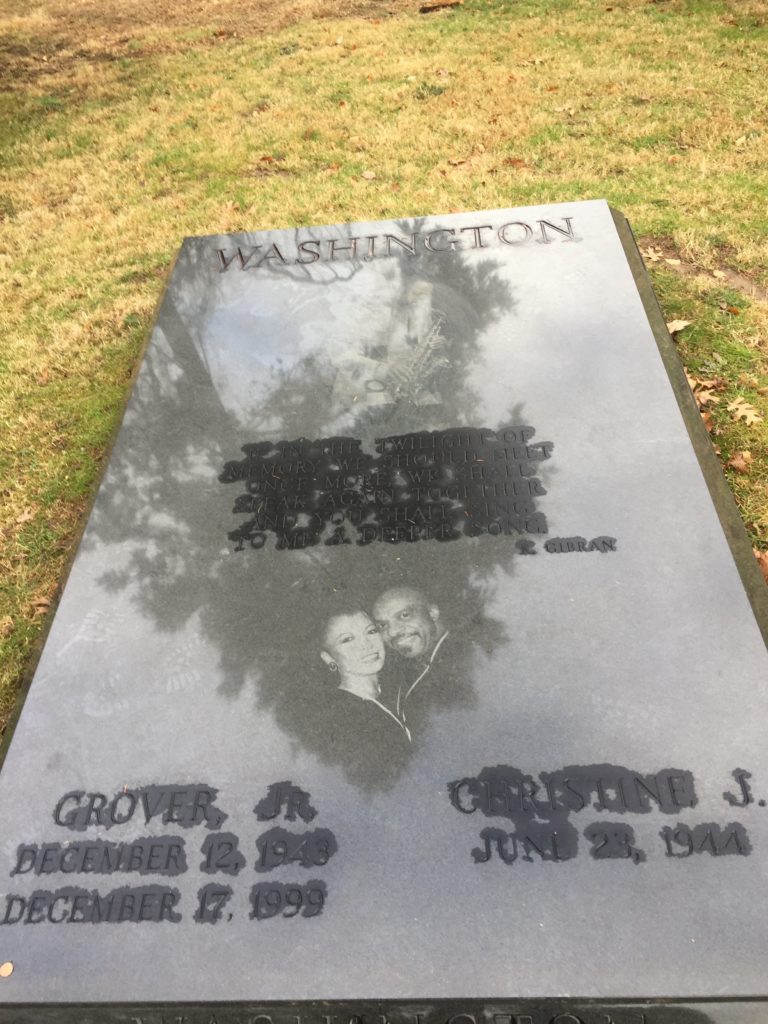Erik Visits an American Grave, Part 965
This is the grave of Grover Washington.

Born in 1943 in Buffalo, Washington grew up in a musical household. His mother was a church organist and his father played the saxophone. Young Grover would also learn to play the saxophone. His father made sure of that. His father, Grover, Sr., was also a huge jazz fan and music collector. So young Grover got to hear people such as Benny Goodman or Fletcher Henderson from the moment he could recognize music. He started playing saxophone at age 8. His brothers became reasonably successful musicians too. Daryl did well on the saxophone and Michael was an accomplished drummer. From the time he was a teen, he was playing professionally, including an early vocal group with Lonnie Smith, later a legendary organist known for his work with George Benson, among others.
Washington traveled around a bit in the early 60s, living in the Midwest and playing with various groups. But he ended up drafted into Army, as were most kids in this era. There were lots of great musicians in the military. They found each other easily enough. Among the friends he made while in the service was a young drummer named Billy Cobham. Now Cobham was already well connected in the New York scene and would become one of the real legends of the fusion jazz era, though I feel his work with John McLaughlin in Mahavishnu Orchestra is a good bit more satisfying than most of his solo work. But in any case, when they got out of the Army, Cobham told Washington to come to New York and he’d set him up.
Indeed, Cobham did introduce Washington to all sorts of people. By the early 70s, Washington was mostly living in Philadelphia and started doing session work. Then in 1971, he recorded his debut album Inner City Blues, with a little bass player known as Ron Carter, as well as many other great musicians. He mostly covered the great R&B of the time, including the title track that was one of the great tracks on Marvin Gaye’s What’s Going On? He also included Gaye’s “Mercy Mercy Me” and Bill Withers’ “Ain’t No Sunshine.” This album did well, as did his his 1972 album All the King’s Horses and 1973’s Soul Box. But it was 1974’s Mister Magic that sent Washington into the stratosphere. This hit #1 on the R&B charts, as did 1975’s Feels So Good. The problem with it though is that it not good. Washington’s music is a precursor to smooth jazz and I do not say that with kindness. He was a tremendously talented musician, undoubtedly. But no one can question its popularity and through the 70s, most of his albums remained highly acclaimed, including 1976’s A Secret Place, 1978’s Reed Seed, and 1980’s Winelight. That latter album had probably Washington’s most well-known song at this point, his collaboration with Bill Withers on “Just the Two of Us.” This is my least favorite Withers song, which says how I feel about Washington. For the record, my wife finds this song unlistenable because of the terrible cover this by Will Smith with his son (sure wasn’t an appropriate title for a song with Jada!). So even when my Withers greatest hits album is one, I am forced to skip this track. That does not bother me.
Now, you might think I am being mean to Washington. But there’s an indisputable fact in my favor: he was Kenny G’s mentor. He also produced a lot of pretty terrible albums in the 80s and 90s that even most of his fans won’t listen to again. He’s hardly alone in that time period leading to trash releases, including people I like much better than Washington.
In 1999, Washington was on the set of CBS’ Saturday Early Show ready to play a set. He had a massive heart attack and died. He was 54 years old.
In recent years, some jazz musicians have tried to rescue Washington’s reputation from the label of “smooth jazz.” Uncompelling. His music was not good, even if his skill was certainly outstanding.
Let’s listen to some Grover Washington. Well, you can anyway.
Grover Washington is buried in West Laurel Hill Cemetery, Bala Cynwyd, Pennsylvania.
If you would like this series to visit other “pioneers” of smooth jazz, you can donate to cover the required expenses here. Hank Crawford is in Memphis and Stanley Turrentine is in Pittsburgh. Previous posts in this series are archived here.
